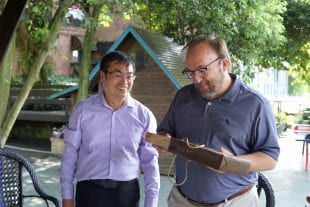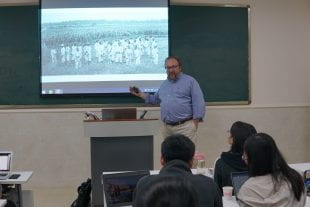A teaching exchange trip to China promotes the study of the American South
Americans generally know little about about China’s massive Three Gorges Dam, even though it generates 11 times the power of Hoover Dam and its construction consumed 13 cities, 140 towns and an estimated 1,600 historic sites for a $25 billion project spanning the Yangtze River.

Rice Associate Professor of History Randal Hall spent a week teaching American Southern history at Southwest University in Chongqing, China.
But the Three Gorges Dam has a distinctly American connection. The huge project was modelled on our nation’s Tennessee Valley Authority (TVA), an economic development program launched during the Great Depression that built nearly 50 hydroelectric dams and other power facilities that now provide electricity to about 10 million people.
This detail, however, is something Rice Professor of History Randal Hall knows all too well. His expertise in Southern economic history is one of the reasons Hall, who also serves as editor of Rice’s prestigious Journal of Southern History, was invited to teach a one-week seminar at Southwest University in Chongqing.
“There’s no reason Southern history shouldn’t be studied everywhere,” said Hall, who visited Chongqing in May as part of the China Residencies Program.
For five years now, an exchange program funded by the Ford Foundation and run by the Organization of American Historians (OAH) and the American History Research Association of China has sent three historians to teach at Chinese universities. Three Chinese historians specializing in the United States also attend the OAH annual meeting in April and spend a week in residence researching at a U.S. university.

Hall spent time getting to know fellow Americanist scholars in China, including host and fellow professor Wang Yong.
“Scholars around the world care about the South,” Hall said. Whether it’s analyzing how economic development programs like the TVA influenced the Three Gorges Dam or how Southern senators like Jesse Helms actively promoted the Cold War, Hall said, the study of the American South is of interest to the greater world.
“These themes have much broader resonance,” Hall said. “People in China care about this.” Indeed, American historians across East Asia have long studied everything from American ethnic issues to U.S. economic policy.
Hall’s own topic for the weeklong teaching engagement was sectionalism, which remains a serious subject around the world today, from Scotland and Spain to Canada and Ukraine — and certainly in China. Hall focused on particular regional loyalties in the South and their impact on American diplomatic history.
The history of the U.S. South — the fluctuating economy, the Civil War, Reconstruction and the rise of conservatism — can hold important lessons for those “striving to make sense of developments elsewhere,” as historian Peter Kolchin once put it in the Journal of Southern History.
“It’s easy for people who aren’t historians to think of Southern history as something defensive, something provincial,” Hall said. “I think it’s easy for people to have that misconception.”
But programs like the China Residencies Program go a long way toward dispelling that myth.
Between lectures, Hall got to know his Chinese hosts and fellow Americanists over robust Sichuan meals and in-depth discussions of topics such as the Farmers Alliance of 1875 that are typically only of interest to historians of America. He also scouted for new book reviewers for the Journal of Southern History, which has been actively internationalizing its contributors for some years.
From covering Colonial-era British views of its Southern colonies (which were somewhat interchangeable with its Caribbean plantations) to Southern political influence on American foreign policy during the Vietnam War (which was outsized), Hall said preparing for the week of lectures at Southwest University also refreshed his own appreciation for just how integral the South has been to shaping the modern world.
It’s a perspective he’ll take back with him into the classroom at Rice.
“Seeing that long span of Southern history as all tied in with international processes kind of changed my views,” Hall said. “Pulling it all together for the first time, to me, was important. It’ll definitely change how I teach the South.”


